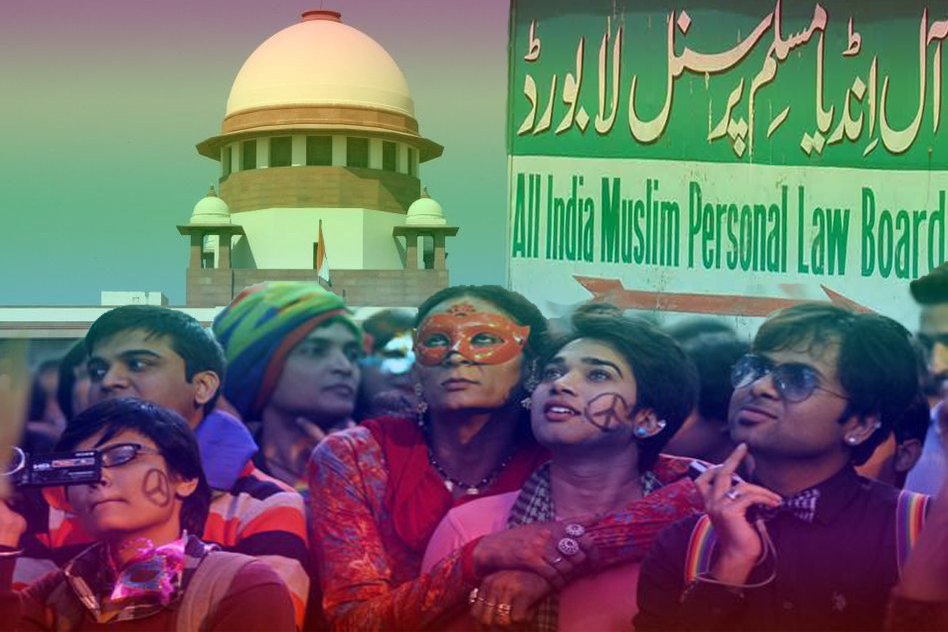Muslim Personal Law Board Will Not Interfere In Supreme Court's Decision On Section 377
15 July 2018 5:10 AM GMT
Section 377 is a 150-year-old law from the British era, which prohibits “carnal intercourse against the order of nature with any man, woman or animal” commonly known as homosexuality, which is punishable with life imprisonment. The SC on July 10 began a review of the archaic law. According to NDTV the Chief Justice of India Dipak Misra also hinted on lifting the ban on homosexuality, which gives a ray of hope to the petitioners.
Earlier, the Delhi high court and the Supreme Court faced a great deal of opposition from religious organizations and lawmakers for considering to scrap the ban.
Indicating acceptance of the Supreme Court’s decision
Reportedly, the All India Muslim Personal Law Board, a non-governmental organization formed in 1973 to adopt suitable strategies for the protection and continued applicability of Muslim Personal Law in India, conveyed that it will not interfere in the proceedings of the court relating to scrapping the ban on section 377. According Islamic law homosexuality amounts to different punishments, including the death penalty, depending on the legal school.
Yet, the organization has decided to abstain from opposing the decision of the Supreme Court on this matter.
Earlier the Central Government also gave its statement that it leaves the decision to the wisdom of the Supreme Court on this matter.
SC begins fresh hearings on section 377
However, India’s struggle against this archaic law dates back to at least a couple of decades when activists and NGOs came together to fight the law that criminalises homosexuality. Today, community members are once again hopeful as the Supreme Court has begun the new hearing of a cluster of petitions challenging section 377 on July 10.
On July 10, a five-judge bench comprising Chief Justice Dipak Misra and Justices R F Nariman, A M Khanwilkar, D Y Chandrachud and Indu Malhotra is hearing six separate petitions.
CJI Dipak Misra, in early 2018 decided to pull-out petitions filed over two years ago by renowned dancer Navtej Singh Johar, journalist Sunil Mehra, celebrity chef Ritu Dalmia, historian Aman Nath and businesswoman Ayesha Kapur. The apex court had also clubbed together another 2016 petition filed by activist Akkai Padmashali which pertains to rights of transgender persons.
An optimistic approach
This time, petitioners, feel that positive outcomes await. This comes after the Supreme Court on July 9 rejected Centre’s plea to adjourn the hearing on Section 377. Additionally, the paradox lies in the fact that people belonging to the LGBTQ community have been routinely denied personal liberty even after the Supreme Court in 2017 passed the landmark judgement that made the right to privacy a fundamental right. The 2017 landmark judgement on privacy observed, “sexual orientation is an essential attribute of privacy.” All these factors, coupled with the fact that Justice D Y Chandrachud was the one who delivered the main judgement on the right to privacy and has been vocal about LGBTQ rights as well, has instilled new confidence among the members of the community.
In India, homosexuality has always been a topic of debate. It has been proven beyond doubt that it is not a disease and unquestionably not a criminal act.
If organizations or individuals place their personal choices aside and allow another individual to choose their sexual alignment with a free and open mind, it is a step forward in building a better world.
Governments and Religious organizations play a vital role in shaping the minds of a society. If they adapt to the culture of accepting individuals for who they are, irrespective of their sexual alignment, they set an example for the society on the whole.
Also Read: “We Are Hopeful” Say Petitioners As SC Begins Fresh Hearings On Section 377
 All section
All section














